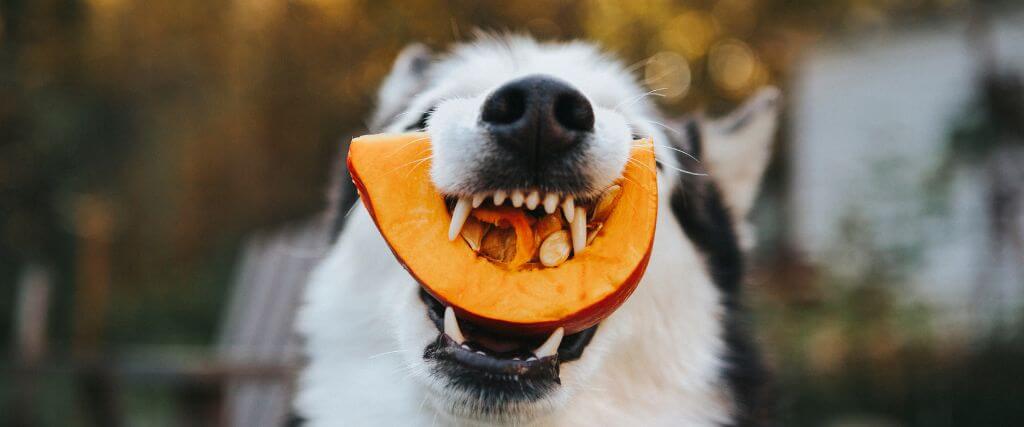This time of year, pumpkin and the holidays go hand in hand. When I think of pumpkin, however, I think of a powerhouse of nutritional benefits — not only for us humans, but for our dogs, too! Let’s break down the specifics of giving your dog pumpkin.
Is Pumpkin Good for Dogs?
Yes! Pumpkin is not only safe for dogs to eat, but it also has a number of nutritional and health benefits for our furry friends. Pumpkin is packed full of beta-carotene and other phytonutrients, such as lutein, flavonoids, and cryptoxanthin. It is also a great source of vitamins A, C, E, and B, as well as minerals and fiber. These natural chemicals and vitamins help ward off disease and keep the body functioning properly by supporting eye health, the immune system, and skin and coat condition, as well as boosting overall antioxidant protection.
Thanks to all of the nutrients these gourds hold, common pumpkin benefits for dogs can include:
- Supports healthy digestion (helps with both diarrhea and constipation)
- Provides fiber for gut health and weight management
- Rich in vitamins A, C, and E for immune, eye, and skin health
- Contains potassium and iron for muscle and blood health
- Hydrating due to high water content
- Promotes a shiny coat and healthy skin
From a traditional Eastern standpoint, pumpkin is sweet and warming to the body. In small to moderate amounts, it strengthens and tonifies digestion, meaning that it promotes the transformation of food to nutritive substances for the rest of the body.
One of the few warming fruits available, pumpkin is especially beneficial for older, weak or debilitated animals as it helps restore vigor and replenish Qi or life force. Many other winter squashes — including butternut, acorn, and spaghetti — are warming to the body as well. These warming foods are ideal to feed in the cooler months.
Giving Pumpkin for Dogs With an Upset Stomach
In traditional Western veterinary medicine, pumpkin is primarily used to promote digestive health. Because of the magic of fiber, pumpkin may be used to alleviate both constipation and diarrhea.
- In constipated pets, fiber helps draw water into the colon and soften feces.
- In pets with diarrhea, fiber acts as a prebiotic, which feeds the beneficial bacteria within the colon. These beneficial bacteria keep the absorptive lining of the colon happy and healthy and promote normal bowel movements.
The antioxidants found in pumpkin are also beneficial when absorbed by the small intestine. The small intestine is the main site of nutrient absorption in dogs, and once they are absorbed, they can fight inflammation and promote the health of numerous bodily systems at a cellular level. Ideally, all pumpkin should be cooked or pureed for optimal absorption.
Pumpkin for Weight Loss in Dogs
In addition to its dietary benefits, low-calorie pumpkin may also be helpful for weight management. Consider replacing a portion of your pet’s regular diet with a small amount of canned or pureed pumpkin (1/4 to 1/8 cup per 10 pounds of body weight) to promote weight loss. You may rotate in other fiber-rich vegetables or legumes, such as broccoli, brussels sprouts, or black beans as well. Because of its high fiber content, pumpkin is also safe and beneficial to feed to diabetic pets.

What Form of Pumpkin Can Dogs Eat?
Pumpkin comes in several forms that are safe for dogs to consume – but owners should be aware that there are some forms of non-natural pumpkin that contain ingredients that are harmful to dogs.
The best and safest forms of pumpkin dogs can eat include:
- Plain canned pumpkin – This form of pumpkin is convenient, already cooked, and easy to mix into your dog’s food. Look for 100% pure pumpkin with no added ingredients like spices or sugars. Be sure to break down any large pieces to avoid choking accidents.
- Fresh, cooked pumpkin – Baked, steamed, or boiled pumpkin (without seasoning) can be mashed or cubed for dogs to eat with their regular food or in small amounts as a special treat. Just be sure to let any cooked pumpkin cool down before giving it to your dog.
- Pumpkin puree – Smooth pumpkin puree works just like canned pumpkin and can be spooned onto meals for extra nutrients or to aid in digestion and address constipation or diarrhea.
Can Dogs Eat Pumpkin Seeds?
Most pet owners don’t realize this, but dogs can eat pumpkin seeds in small amounts when served roasted and plain, so skip the oil, salt, sugar, and spices. While pumpkin seeds can be considered a superfood for humans, dogs don’t digest them the same way we do, making it so that special considerations need to be made if giving your dog pumpkin seeds.
Protein-packed pumpkin seeds in small amounts may be given as treats, but use caution — your pet must be large enough to pass the seeds in case they slip by unchewed. Unfortunately, that rules cats and small dogs out! If possible, shells should also be removed from the seeds to avoid choking.
Some studies have indicated that there may also be a benefit in clearing intestinal parasites using pumpkin seeds, but I do not recommend this method as the large volumes of seeds needed can create irritation and constipation. Instead, if you are concerned about worms or parasites, get in touch with your veterinarian, and they’ll help you navigate effective and safe treatment options.

All Things in Moderation: How Much Pumpkin to Give a Dog
While pumpkin is great and can help with several health issues, there is such a thing as too much pumpkin for dogs. When given too much pumpkin, dogs can experience
If your pet has not yet had the pleasure of a pumpkin snack, be sure to start with only small amounts. Dogs may be fed one teaspoon to one tablespoon per 10 to 15 pounds of body weight. Always use your discretion to adjust the amount depending on your dog’s specific needs and preferences. If you’re ever in doubt about how much pumpkin to give a dog, ask your vet; they’ll be happy to help you portion out what’s appropriate for your dog’s needs.
Can Cats Eat Pumpkin?
Yes! And the good news is that all of the same benefits and usage guidelines we’ve outlined here for feeding dogs pumpkin are transferable to cats!
The only major difference will be in how much pumpkin to give a cat, as portion sizes will need to be different to account for a cat’s smaller size. Generally, cats may be fed one teaspoon to one tablespoon per can of food.
Talk to Your Vet About Adding Pumpkin to Your Dog’s Diet
Pumpkin can be a healthy, tasty treat for dogs, but every pet is different. Check with your veterinarian before making changes to your dog’s diet. As you enjoy the cooler fall weather, your pup can enjoy the wonderful benefits of pumpkin, too!
If you have questions and you'd like to reach out to us, you can call us directly at (704) 827-0616, or you can email us at [email protected]. Don't forget to follow us on social media Facebook, Instagram.

